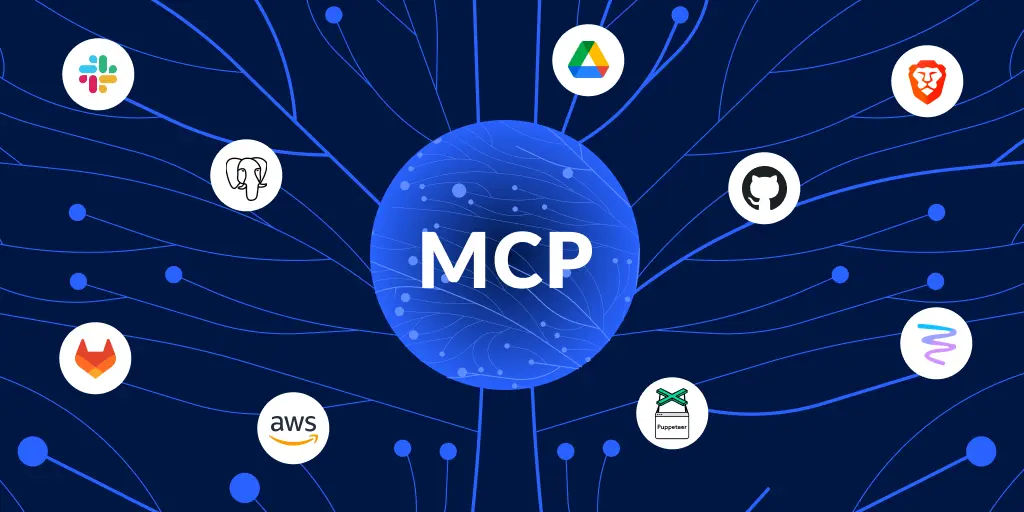Steps
1
Introduction
2
See it In Action
3
Conclusion
The AI Integration Challenge
AI agents are powerful, but they're often isolated from the crucial business systems and workflows that drive your enterprise. How do you connect them to your operational data and processes?
Without a standard approach, connecting AI agents to enterprise systems has been a tedious, manual process. It often involves:
- Building custom APIs for every AI use case.
- Developing brittle, point-to-point connectors for each new AI tool.
- Lacking a universal way for AI agents to discover and understand what capabilities are available to them.
- "Reinventing the wheel" for every new AI project, leading to duplicated effort and maintenance overhead.
This approach is slow, expensive, and inconsistent. It prevents businesses from moving quickly and leveraging the full potential of AI.
Introducing Model Context Protocol
This is precisely where the Model Context Protocol (MCP) becomes critical. It provides the much-needed standardization to overcome these fragmented integration challenges, enabling seamless and consistent communication between AI agents and enterprise systems.
Model Context Protocol (MCP) is an open standard that enables AI systems to securely connect to external data sources and tools. Unlike REST APIs that expose raw data, MCP provides:
- Structured Tool Interfaces: AI agents interact with well-defined business functions
- Resource Management: Controlled access to enterprise data
- Prompt Engineering: Dynamic content generation for complex scenarios
Flogo's New Model Context Protocol (MCP) Connector
TIBCO Flogo now supports the Model Context Protocol (MCP), an emerging open standard that lets AI agents discover and interact with external systems through a common interface. Think of it as a universal connector for AI.
Flogo MCP brings this standard directly to your TIBCO Integration Platform. With a simple, new trigger, you can expose your existing Integration workflows as MCP-compliant interfaces, instantly making them accessible to any MCP-compatible AI tool. This means you can reuse your existing Integrations, which are already connected to your databases, SaaS applications, and legacy systems, and make them available to your AI agents without writing a single line of new integration code.
The Value: Reuse Instead of Rebuild
Instead of building custom AI integrations, Flogo MCP enables you to reuse your existing workflows, making them AI-ready:
- ❌ Before: Build Custom API → Custom AI Integration → Maintain Both
- ✅ Now: Existing Flogo Workflow → Add MCP Interface → AI Ready
Three Ways Flogo MCP Empowers Your AI Agents
The Model Context Protocol defines three primary capabilities that Flogo MCP makes available:
- 🔍 Resources (Data Access): Expose your Integration workflows that aggregate data from multiple systems as an AI-accessible resource.
- ⚙️ Tools (Process Execution): Turn your Integration workflows that handle complex business logic into "tools" that an AI agent can call.
- 📧 Prompts (Dynamic Content): Allow AI agents to generate dynamic, contextual content using your business data.
Real-World Use case: AI-Enhanced Customer Service
In today's fast-paced digital world, providing efficient and effective customer service is paramount. However, many businesses struggle with a significant challenge: the manual and fragmented nature of their customer support systems. Customer service representatives (CSRs) often find themselves juggling multiple, disparate enterprise systems—such as a CRM database, an order system, and a billing system—just to handle a single customer inquiry.
This Traditional Manual information-gathering process creates several critical bottlenecks:
- Inefficient Workflows: Representatives spend a disproportionate amount of their time searching for information and performing repetitive, administrative tasks. This reduces their capacity to focus on complex, high-value problem-solving.
- Delayed and Inconsistent Responses: The time it takes to manually aggregate data from different sources can lead to slow response times. This can result in customer frustration and a poor brand experience, especially when dealing with time-sensitive issues like order delays.
- Limited Scalability: A reliance on human agents for every customer interaction, regardless of its complexity, makes it difficult and costly to scale customer service operations. As a business grows, so does the demand on its support team, often requiring a linear increase in headcount to keep up.
With Flogo MCP, an AI assistant can now be integrated directly into the agent's workflow:
- AI Assistant: "Get the complete profile for customer 12345."
- Flogo MCP Resource Call: The AI calls your existing customer data aggregation workflow, which securely fetches and unifies data from various systems.
- AI Assistant: "Update order ORD-789 to expedited status."
- Flogo MCP Tool Call: The AI executes your existing Flogo order processing workflow, which handles all the complex business logic, such as checking inventory and sending notifications.
- AI Assistant: "Generate a follow-up email for this situation."
- Flogo MCP Prompt Call: The AI uses your Flogo workflow to dynamically generate a professional, context-aware email, complete with the updated order status and next steps.
The result is the same trusted business logic, now powered by AI, leading to faster resolutions and a better customer experience.
Technical Architecture

Discussion
You
